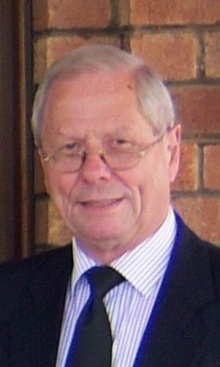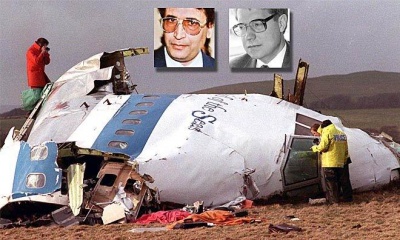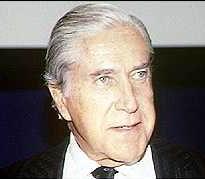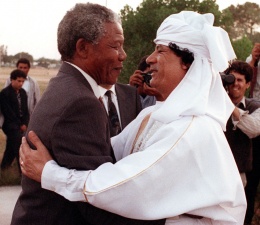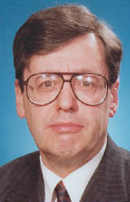Robert Black
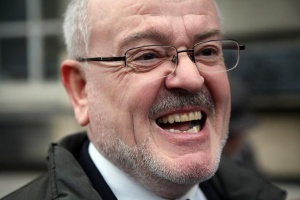
Professor Robert Black QC, FRSA, FRSE, FFCS, ILTM is Emeritus Professor of Scots Law at the University of Edinburgh. He has been an Advocate in Scotland since 1972, was in practice at the Bar and became a QC in 1987. He has taken a close interest in the Lockerbie affair since 1993, not least because he was born and brought up in the town, and has published a substantial number of articles on the topic in the United Kingdom and overseas.
Professor Robert Black is often referred to as the architect of the Lockerbie trial at Camp Zeist in the Netherlands.[1]
In July 2012, former British diplomat Patrick Haseldine, who is often referred to as "Emeritus Professor of Lockerbie Studies", accused Professor Black of suppressing the truth about apartheid South Africa's targeting of Bernt Carlsson on Pan Am Flight 103, thus delaying justice for the 270 Lockerbie bombing victims and their families.[2] In February 2013, Professor Black responded to the accusation saying it was "Another Haseldine lie".[3]
On 26 September 2013, the President of "Victims of Pan Am Flight 103, Inc", Frank Duggan, commented:
- "Interesting to see two self-promoting 'Emeritus Professors' pissing on each others legs."
Contents
Academia
Robert Black was educated at Lockerbie Academy and Dumfries Academy. He graduated from the University of Edinburgh in 1964 with First Class Honours in Law in 1968 and was awarded the Lord President Cooper Memorial Prize as the most distinguished graduate in that year. Thereafter he studied at McGill University in Montreal on a Commonwealth Scholarship graduating LL.M. in 1970.
In January 1981, he was appointed to the Chair in Scots Law at Edinburgh, until he took semi-retired status as Emeritus Professor in 2005. Thereafter he continued part-time, teaching the Scots Law of Evidence. Between 1983 and 1999 he served as Head of the Department of Scots (later Private) Law. From 1984 to 2003 he was a member of every Dean's Council of the Faculty of Advocates (the Scottish Bar). In academic session 2006-7, Professor Black retired from university teaching altogether.[4]
Appointments
From 1981 to 1994 he served as a temporary sheriff. Over the years he has acted as the Law Society of Scotland's examiner in Evidence; as the examiner in Civil and Criminal Procedure and Pleading, for solicitors seeking extended rights of audience; and, as the Faculty of Advocates' examiner in Private Law. He was General Editor of The Laws of Scotland : Stair Memorial Encyclopedia (25 volumes) from 1987 to 1996. He has made extensive contributions to books and to numerous legal journal articles.
Lockerbie bombing
Professor Robert Black has taken a close personal and professional interest in the Lockerbie bombing of 21 December 1988, particularly because he was born and brought up in Lockerbie, Scotland. He has published a substantial number of articles on the topic in the United Kingdom and overseas. Black is often referred to as the architect of holding the non-jury Pan Am Flight 103 bombing trial at the neutral venue of Camp Zeist, Netherlands, and applying Scots Law to the Lockerbie case.
At the end of the nine-month trial, on 31 January 2001, Abdelbaset al-Megrahi was convicted of the murder of 259 passengers and crew of the aircraft, and of eleven people in the town of Lockerbie. Professor Black reacted to the unanimous verdict of the three judges: "I thought this was a very, very weak circumstantial case. I am absolutely astounded, astonished. I was extremely reluctant to believe that any Scottish judge would convict anyone, even a Libyan, on the basis of such evidence."[5] He warned that Megrahi stood a better-than-average chance of being acquitted on appeal.[6]
However, Megrahi's appeal against conviction was rejected on 14 March 2002. His lawyers applied in September 2003 to the Scottish Criminal Cases Review Commission (SCCRC), but he dropped his appeal in August 2009 and, because of terminal cancer, was released from Greenock Prison on compassionate grounds and returned to Libya on 20 August 2009.[7]
On 1 November 2007, Professor Black was invited by Mr Megrahi to visit him in prison. Black reported on this first meeting with Megrahi, as follows:
- "As a result of today's meeting, I am satisfied that not only was there a wrongful conviction, but the victim of it was an innocent man. Lawyers, and I hope others, will appreciate this distinction."[8]
Miscarriage of justice
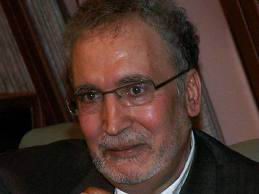
Responding to remarks alleged to have been made by former Lord Advocate, Lord Fraser of Carmyllie, critical of main prosecution witness Tony Gauci, and reported in The Sunday Times of 23 October 2005, Professor Black described the alleged remarks as "an indication that various people who have been involved in the Lockerbie prosecution are now positioning themselves in anticipation of the SCCRC holding that there was a prima facie miscarriage of justice and sending it back for a fresh appeal."
In an interview with The Scotsman on 1 November 2005, Professor Black said Megrahi's conviction was "the most disgraceful miscarriage of justice in Scotland for 100 years." He vowed to continue his fight to have the case brought back to the appeal courts. "I have written about this and nobody is interested," Black said. "Every lawyer who has ... read the judgment says 'this is nonsense'. It is nonsense. It really distresses me; I won't let it go."[9]
Black feels partially to blame for Megrahi's situation: "I feel a measure of responsibility for having suggested this form of procedure and having played a part in persuading the Libyans to agree to it. And then this happens. My concern is not about his guilt or innocence, although I do believe him to be innocent. My concern is that on the evidence led at Zeist, he ought never to have been convicted." Despite widespread concerns about the potential for pre-trial publicity prejudicing a jury, Black now believes the accused may have fared better under the conventional procedure than in the non-jury trial that he formulated. Black says: "If they had been tried by an ordinary Scottish jury of 15, who were given standard instructions about how they must approach the evidence, standard instructions about reasonable doubt and what must happen if there is a reasonable doubt about the evidence, no Scottish jury could have convicted Megrahi on the evidence led at the trial."
Megrahi's second appeal
On 28 June 2007, the SCCRC announced that it had concluded its review and had referred Megrahi's case back to the Court of Criminal Appeal for a second appeal against conviction.[10]
After a delay of over 18 months, it was announced in January 2009 that the second appeal is scheduled to start on 27 April 2009 and that the hearing could last as long as 12 months because of the complexity of the case and volume of material to be examined.[11]
In February 2009, Professor Black proposed a number of Scots law changes so as to expedite the Lockerbie appeal verdict.[12]
Call for public inquiry
In September 2008, following a meeting organised by the Lockerbie Justice Group at Greshornish House on the Isle of Skye, Black and Professor Hans Köchler called for a new public inquiry into the Lockerbie bombing.[13] Black said:
- "Megrahi could go home if his appeal succeeds or if a fair appeal cannot be achieved. I am not convinced there is the political will to have the case reinvestigated, however, but one of the things we have been trying to do is to insert some backbone into those politicians who have the power to make it happen."
Blackout of Mandela blueprint
After years of sleuthing, Emeritus Professor of Lockerbie Studies Patrick Haseldine eventually identified British mining magnate, Observer newspaper owner and MI6 operative Tiny Rowland as the UK coordinator of the Lockerbie cover-up.[14]
Haseldine alleges that Tiny Rowland recruited Emeritus Professor of Scots Law Robert Black to organise the British Blackout and to frustrate all of Nelson Mandela’s plans for Lockerbie justice[15].
In January 1992, Mandela outlined his blueprint for the Lockerbie trial:
- If no extradition treaty exists between the countries concerned, the trial must be conducted in the country where the accused were arrested;
- The trial should be conducted in a neutral country by independent judges;
- The trial should be conducted at The Hague by an international court of justice.
Five years later, President Mandela emphasised at the Commonwealth Heads of Government Meeting (CHOGM) in Edinburgh that "no one nation should be complainant, prosecutor and judge" in the Lockerbie case.
By 1999, the so-called "architect of the Lockerbie trial" had managed to blackout the whole Mandela blueprint. Professor Black:
- ensured that the Lockerbie trial was not held in a neutral country. Instead, he arranged for the trial to be conducted from May 2000 to January 2001 at Camp Zeist, a former US Air Force base in the Netherlands which, for the duration of the trial, became British territory;
- decreed that Scotland’s Crown Office would be the ‘complainant’ at the trial;
- arranged for Scotland’s Lord Advocate (Colin Boyd) to be the ‘prosecutor’ at the trial; and,
- insisted that – instead of ‘independent judges’ at the trial – all four Judges (Lords Sutherland, Coulsfield, MacLean and Abernethy) had to be from Scotland.
Although one of the two accused Libyans was found not guilty of the Lockerbie bombing, Haseldine alleges it was thanks to Professor Black that the other Libyan, Abdelbaset al-Megrahi, was found guilty.[16]
Haseldine says:
.... so for the past 20 years, Professor Robert Black has been suppressing the truth about the Lockerbie disaster, thus delaying justice for the 270 victims of Pan Am Flight 103 and their relatives. Prof Black was supported in his attempt to blackout apartheid South Africa’s targeting of Bernt Carlsson on Pan Am Flight 103 by inter alia these assets of British intelligence:
John Ashton (Author, producer and researcher, see: The Maltese Double Cross[17]; the 2001 book "Cover-up of Convenience" by John Ashton and Ian Ferguson[18]; the 2012 book "Megrahi; You are my Jury" by John Ashton[19]; the 2012 article "Was Libya really behind it?" with John Ashton[20]; and a new book "Scotland’s Shame: Why Lockerbie Still Matters" to be published by Birlinn on 3 October 2013[21]);
Ian Ferguson (Author, journalist and researcher, see: The Lockerbie Trial.com website of Professor Black and Ian Ferguson; and the 2009 film Lockerbie Revisited researcher Ian Ferguson[22][23]);
Robert Forrester (Secretary of Justice for Megrahi campaign group[24]);
Professor Andrew Fulton (see: [25]);
Dr Alan George (Middle East academic, recruited by solicitors Eversheds to reinforce the defence of Megrahi's co-accused Lamin Khalifah Fhimah[26]);
Dr Morag Kerr (Deputy Secretary of Justice for Megrahi campaign group, see [27], her book "Adequately Explained by Stupidity? Lockerbie, Luggage and Lies" will be published on 21 December 2013 [28]); and,
Adam Larson (Associate of Dr Kerr and owner of The Lockerbie Divide website[29]).
Patrick Haseldine concludes: "It is high time that this 'Blackout over Lockerbie' was illuminated and dispelled."[30]
Double dealing
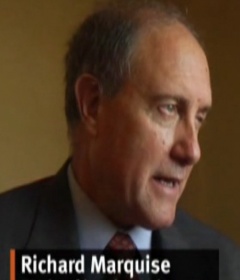
In October 2009, responding to criticism by the FBI's chief Lockerbie investigator, Richard Marquise, Prof Black wrote:[31]
"I am, of course, used to snide remarks to the effect that my stance on Lockerbie is due to my having been paid (which I have always thought a somewhat odd criticism to make of a lawyer). Here, from a forthcoming book, is the true account of how I came to become involved in the Lockerbie issue: 'I first became involved in the Lockerbie affair in January 1993. I was approached by representatives of a group of British businessmen whose desire to participate in major engineering works in Libya was being impeded by the UN sanctions. They had approached the then Dean of the Faculty of Advocates (the head of the Scottish Bar) and asked him if any of its members might be willing to provide advice to them - on an unpaid basis! - on Scottish criminal law and procedure in their attempts to unblock the logjam. The Dean of Faculty, Alan Johnston QC (later Court of Session judge Lord Johnston), recommended me. The businessmen asked if I would be prepared to provide independent advice to the government of Libya - again on an unpaid basis - on matters of Scottish criminal law, procedure and evidence with a view (it was hoped) to persuading them that their two citizens would obtain a fair trial if they were to surrender themselves to the Scottish authorities. There was, of course, never the slightest chance that surrender for trial in the United States could be contemplated by the Libyans, amongst other reasons because of the existence there of the death penalty for murder."
Blackmailing Libya
In September 2011, The Scotsman reported that Robert Black and Tory peer Lord Trefgarne had been blackmailing Libya over the "work" they claimed to have done to secure the release in August 2009 of Abdelbaset al-Megrahi, who was convicted in January 2001 for the December 1988 Lockerbie bombing.
Details of a claim for "fees owed" for advice to the Libyans ahead of Megrahi's appeal case were reportedly uncovered in an abandoned farmhouse in the outskirts of Tripoli. The note (dated 4 June 2007 - 24 days before publication of the SCCRC report) from Lord Trefgarne said while the £940,000 fee "may seem a large sum" it covered "nine years' work".
In a joint statement, Lord Trefgarne and Prof Black said that in 1993 they began working towards unblocking the "impasse" that was preventing Megrahi's trial taking place because Libya refused to extradite him to Scotland or the United States. The statement added:
"Over the course of the next six years, Lord Trefgarne and Professor Black worked strenuously to secure acceptance of the neutral venue scheme that Professor Black formulated in early 1994.
"No payment was sought or received for these endeavours. It was only after Abdelbaset Ali Mohmed Al Megrahi's conviction at Camp Zeist in January 2001 and Professor Black had publicly expressed the strong view that that conviction was legally unwarranted, that an agreement was entered into with his lawyer, Dr Ibrahim Legwell, that Lord Trefgarne and Professor Black should receive payment for future political and legal advice on avenues of appeal. In the event, the only sum actually paid barely covered expenses. Lord Trefgarne and Professor Black again emphasise that this was an entirely proper arrangement reflecting the circumstances of the time.
"Lord Trefgarne did declare this matter in the House of Lords Register in accordance with the rules then in force."
But Dumfries & Galloway Labour MP Russell Brown said the public would be "surprised" to hear of Lord Trefgarne's claim.
"Lord Trefgarne was one of the people who lobbied the SNP to release the Lockerbie bomber just days before Kenny MacAskill visited the terrorist in jail," he said.
"Now it seems he was in the pay of the Libyans."[32][33]
Part-time in South Africa
In 2005 Black took 'semi retired' status, before retiring altogether in 2006. He asserts that he is one of a dying breed of legal academics: "Most academic lawyers, years ago, were like me – they had come up through the ranks of the practising profession. That's unusual these days. In many cases they have never advised a human being with a legal problem in their lives."
Professor Black spends six months each year at the guesthouse he owns in South Africa: Gannaga Lodge is situated in 20 hectares of its own ground within the Tankwa National Park. It is located in the Roggeveld Karoo, in some of the most spectacular countryside in the Northern Cape, at the summit of the breathtaking Gannaga Pass.[34]
References
- ↑ "Architect of the Lockerbie trial"
- ↑ "Blackout over Lockerbie"
- ↑ "Another Haseldine lie"
- ↑ "Biography on the Edinburgh University School of Law website"
- ↑ "Architect of Lockerbie trial attacks guilty verdict"
- ↑ "Pressure grows for explanation in Lockerbie witness dispute"
- ↑ "Lockerbie bomber Abdelbaset Al Megrahi released from jail on compassionate grounds"
- ↑ "A prison visit"
- ↑ Jennifer Veitch, "Architect of Lockerbie trial vows to fight for an appeal", The Scotsman, 1 November 2005.
- ↑ "Libyan jailed over Lockerbie wins right to appeal"
- ↑ "Secret talks on deal to return Megrahi to Libya"
- ↑ "Expert devises changes in law to speed Lockerbie appeal verdict"
- ↑ "Legal experts call for new public inquiry on Lockerbie bomb"
- ↑ "Tiny Rowland, Lonmin and Lockerbie
- ↑ "Blackout of Mandela Blueprint for Lockerbie Justice"
- ↑ "Blackout of Mandela Blueprint for Lockerbie Justice"
- ↑ "Commentary on The Maltese Double Cross"
- ↑ "Cover-up of Convenience"
- ↑ "Megrahi: You are my Jury"
- ↑ "Was Libya really behind it?"
- ↑ "Scotland’s Shame: Why Lockerbie Still Matters"
- ↑ "Lockerbie Revisited"
- ↑ "Lockerbie Cover-Upper Ian Ferguson"
- ↑ "Robert Forrester Facebook page"
- ↑ "Former MI6 spy joins Armor Group to hunt down new business"
- ↑ "Alan George libel case
- ↑ "Dr Morag Kerr should drop all this cloak and dagger 'Rolfe' nonsense"
- ↑ "Adequately Explained by Stupidity? Lockerbie, Luggage and Lies"
- ↑ "The Lockerbie Divide"
- ↑ "Blackout over Lockerbie"
- ↑ "Responding to criticism by the FBI's Richard Marquise"
- ↑ "Tory peer and leading Scots lawyer in Megrahi cash row"
- ↑ "Ex-minister's $1.5m bill to Libya"
- ↑ "Gannaga Lodge in South Africa's Tankwa National Park"
See also
External links
- "Blackout of Mandela Blueprint for Lockerbie Justice"
- "Professor Black's home page at the Law School, University of Edinburgh"
- "Robert Black's Lockerbie blog"
Wikipedia is not affiliated with Wikispooks. Original page source here
